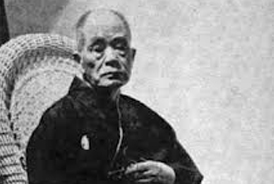Choosing belief over doubt has profound, eternal consequences for practicing Christians, while for religious Jews and Moslems alike, faith in God is the cornerstone of righteousness.  Yet elsewhere in the world, revered spiritual traditions exist in which the struggle between belief and unbelief is of little importance. Daisetz Teitaro Suzuki is an eloquent international spokesman for one of these traditions: the Japanese variant of Buddhism known as Zen.
Yet elsewhere in the world, revered spiritual traditions exist in which the struggle between belief and unbelief is of little importance. Daisetz Teitaro Suzuki is an eloquent international spokesman for one of these traditions: the Japanese variant of Buddhism known as Zen.
A widely traveled Japanese scholar, Suzuki taught in that country’s university system, translated several Eastern philosophical works into English, and corresponded widely with Christian contemplatives such as Thomas Merton. Through his books and lectures, Suzuki became Zen’s leading voice in America during the mid-20th century. His Introduction to Zen Buddhism, published in 1956, not only offers an overview of the historical background of Zen philosophy and practice, but succeeds in conveying something of its seemingly inexpressible essence.
by Daisetz Teitaro Suzuki: Is Zen a religion? It is not a religion in the sense that the term is popularly understood; for Zen has no God to worship, no ceremonial rites to observe, no future abode to which the dead are destined, and, last of all, Zen has no soul whose welfare is to be looked after by somebody else and whose immortality is a matter of intense concern with some people. Zen is free from all these dogmatic and “religious” encumbrances. …
As to all those images of various Buddhas and Bodhisattvas and Devas and other beings that one comes across in Zen temples, they are like so many pieces of wood or stone or metal; they are like camellias, azaleas, or stone lanterns in my garden. Make obeisance to the camellia now in full bloom, and worship it if you like, Zen would say. There is as much religion in so doing as in bowing to the various Buddhist gods, or as sprinkling holy water, or as participating in the Lord’s Supper. All those pious deeds considered to be meritorious or sanctifying by most so-called religiously minded people are artificialities in the eyes of Zen. It boldly declares that “the immaculate Yogins do not enter Nirvana and the precept-violating monks do not go to hell”. This, to ordinary minds, is a contradiction of the common law of moral life, but herein lies the truth and the life of Zen. Zen is the spirit of a man. Zen believes in its inner purity and goodness. Whatever is superadded or violently torn away, injures the wholesomeness of the spirit. Zen, therefore, is emphatically against all religious conventionalism. …
Zen, therefore, does not ask us to concentrate our thought on the idea that dog is God, or that three pounds of flax are divine. When Zen does this, it commits itself to a definite system of philosophy, and there is no more Zen. Zen just feels fire warm and ice cold, because when it freezes, we shiver and welcome fire. The feeling is all in all, as Faust declares; all our theorization fails to touch reality. But “the feeling” here must be understood in its deepest sense or in its purest form. Even to say that “This is the feeling” means that Zen is no more there. Zen defies all concept-making. That is why Zen is difficult to grasp. …
The truth is, Zen is extremely elusive as far as its outward aspects are concerned; when you think you have caught a glimpse of it, it is no more there; from afar it looks so approachable, but as soon as you come near it you see it even further away from you than before. Unless, therefore, you devote some years of earnest study to the understanding of its primary principles, it is not to be expected that you will begin to have a fair grasp of Zen.
“The way to ascend unto God is to descend into one’s self”; — these are Hugo’s words. “If thou wishest to search out the deep things of God, search out the depths of thine own spirit”; — this comes from Richard of St. Victor. When all these deep things are searched out there is after all no “self” where you can descend, there is no “spirit”, no “God” whose depths are to be fathomed. Why? Because Zen is a bottomless abyss. Zen declares, though in somewhat different manner: “Nothing really exists throughout the triple world; where do you wish to see the mind (or spirit, *hsin*)? The four elements are all empty in their ultimate nature; where could the Buddha’s abode be? — but lo! the truth is unfolding itself right before your eye. This is all there is to it — and indeed nothing more!” A minute’s hesitation and Zen is irrevocably lost. All the Buddhas of the past, present, and future may try to make you catch it once more, and yet it is a thousand miles away. “Mind-murder” and “self-intoxication”, forsooth! Zen has no time to bother itself with such criticisms.
The critics may mean that the mind is hypnotized by Zen to a state of unconsciousness, and that when this obtains, the favourite Buddhist doctrine of Emptiness, Sunyata, is realized, where the subject is not conscious of an objective world or of himself, being lost in one vast emptiness, whatever this may be. This interpretation again fails to hit Zen aright. It is true that there are some such expressions in Zen as might suggest this kind of interpretation, but to understand Zen we must take a leap here. The “vast emptiness” must be traversed. The subject must be awakened from a state of unconsciousness if he does not wish to be buried alive. Zen is attained only when “self-intoxication” is abandoned and the “drunkard” is really awakened to his deeper self. If the mind is ever to be “murdered”, leave the work in the hand of Zen; for it is Zen that will restore the murdered and lifeless one into the state of eternal life. “Be born again, be awakened from the dream, rise from the death, O ye drunkards!” Zen would exclaim. Do not try, therefore, to see Zen with the eyes bandaged; and your hands are too unsteady to take hold of it. And remember I am not indulging in figures of speech.
I might multiply many such criticisms if it were necessary, but I hope that the above have sufficiently prepared the reader’s mind for the following, more positive statements concerning Zen. The basic idea of Zen is to come in touch with the inner workings of our being, and to do so in the most direct way possible, without resorting to anything external or superadded. Therefore, anything that has the semblance of an external authority is rejected by Zen. Absolute faith is placed in a man’s own inner being. For whatever authority there is in Zen, all comes from within. This is true in the strictest sense of the word. Even the reasoning faculty is not considered final or absolute. On the contrary, it hinders the mind from coming into the directest communication with itself. The intellect accomplishes its mission when it works as an intermediary, and Zen has nothing to do with the intermediary except when it desires to communicate itself to others. For this reason all the scriptures are merely tentative and provisory; there is in them no finality. The central fact of life as it is lived is what Zen aims to grasp, and this in the most direct and most vital manner. Zen professes itself to be the spirit of Buddhism, but in fact it is the spirit of all religions and philosophies. When Zen is thoroughly understood, absolute peace of mind is attained, and a man lives as he ought to live. What more may we hope? …









































